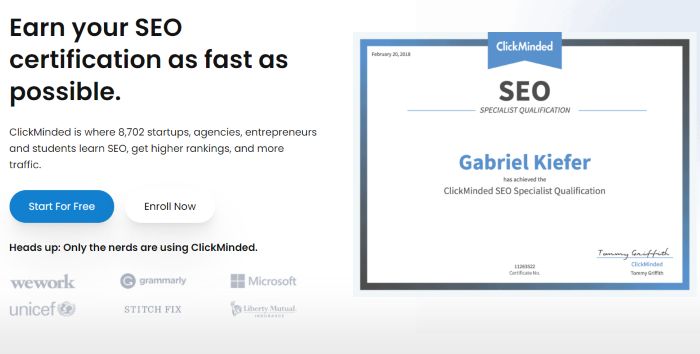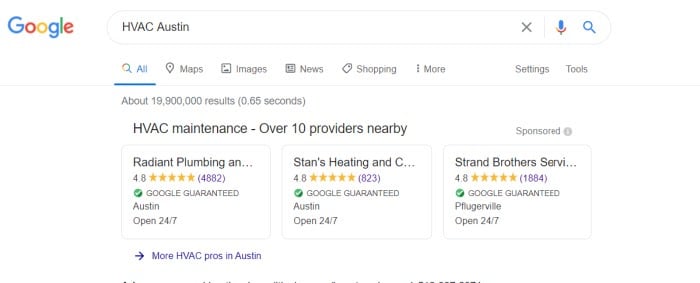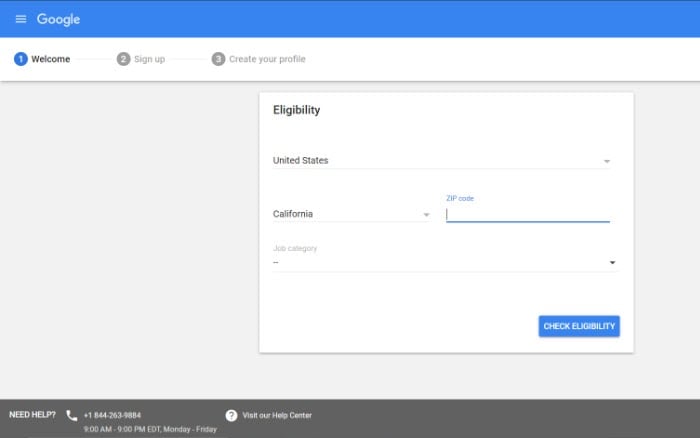The post Colorblindness Is Worth a Try appeared first on Buy It At A Bargain – Deals And Reviews.
Tag: Worth
Colorblindness Is Worth a Try
The post Colorblindness Is Worth a Try appeared first on Buy It At A Bargain – Deals And Reviews.
SEO Certifications: Are They Worth It?
Want to learn more about SEO? There’s a good chance you’ve seen dozens of SEO certification courses, ranging from offerings from top SEO platforms like Semrush to “experts” you’ve never heard of.
If you’re unsure if an SEO certification is right for you—or are struggling to figure out which course is the right fit—you’re in the right place. With more than two decades of search marketing experience under my belt, I’ve seen dozens of SEO certification courses come and go.
I’ve also spent time researching the top courses to make the decision process easier for you.
Before we dive into whether or not you should (or shouldn’t) get an SEO certification, let’s talk about what they are.
What Is An SEO Certification?
An SEO certification is a verification provided by a company verifying that you’ve completed their SEO course. Unlike a college degree or certificate program through a university, SEO certifications are not regulated.
However, they can help you learn the fundamentals of SEO and show employers or clients that you take your education seriously.
What Are Some of The Best SEO Certifications?
The best SEO certifications come from well-established, trusted brands in the marketing industry. That’s because, as I mentioned above, there is no regulation on SEO certifications. However, being certified by a trusted brand shows employers and clients that you’ve put in the effort—and they are more likely to trust that you know what you’re doing.
To help you decide, I’ve analyzed the top SEO certifications from trusted brands, including the content they cover, cost, and pros and cons.
The reality is there’s no one right SEO certification. Someone wondering “What is SEO?” may choose a course aimed at beginners, while someone wanting to up their technical SEO expertise might choose another.
The right SEO certification is the one that works for your knowledge level, budget, and goals.
Yoast All-Around SEO Training
Cost: $99 per year (includes access to Yoast SEO premium plugin)
Best for: Students who want to learn a little more than the basics of SEO.

Yoast is one of the top WordPress plugins for on-page SEO, so it’s no surprise they offer an SEO certification, and their certification is a top-notch choice.
You’ll learn how to perform keyword research, SEO copywriting, how to improve site structure, and technical SEO strategies like improving site speed and security. The course also covers off-page SEO tactics like link building, UX, email marketing, and social media.
The course includes:
- Three hours of instructional videos.
- Quizzes
- Downloadable checklists
- Certificate
- Badge
- Access to the course and Yoast SEO plugin for one year
Pros:
- Affordable ($99 for a year of access.)
- Covers all the main topics of SEO
Cons:
- Only three hours of videos
- Likely too basic for those with mid-level SEO skills
Clickminded SEO Specialist Qualification
Cost: $997 for lifetime access to one course.
Best for: Students willing to invest time and money for a deep understanding of SEO.

Clickminded offers a fast, in-depth SEO certification designed to get you up to speed as fast as possible. That makes it ideal for students who are willing to invest the time required to learn a new skill.
This course covers a range of SEO strategies, including the basics of organic search, the best SEO tools to use, how to create an SEO strategy, on-page SEO, link building, and technical SEO. The course also offers lifetime access to several mini-courses about SEO for local businesses, Shopify sites, Pinterest, YouTube, and Amazon.
This is a full-featured Google SEO certification course, though it’s definitely a bit pricey. It’s ideal for agencies that can make the most of their team pricing.
Pros:
- They offer team pricing ($4997 for 10 reusable company licenses that let you access many courses.
- Can start for free to see if you like it.
Cons:
- A bit pricey for beginners
- Less brand recognition than other courses (Semrush, Moz, etc.)
Moz’s SEO Fundamentals
Cost: $595
Best for: Beginners or those with limited SEO experience

Moz’s SEO Essentials certification is an on-demand, six-part course that introduces fundamental SEO concepts and helps you understand how to implement those new skills using Moz’s paid SEO tool, Moz Pro. The class takes around six hours to watch and includes a skills test at the end to verify your newfound SEO skills.
The course covers a wide range of SEO topics, including fundamental SEO concepts, how to perform keyword research, on-page optimization, link building, and how to track and report SEO metrics. Each section requires you to complete tasks, which provides a bit of hands-on experience.
Pros:
- Includes hands-on practice to solidify skills.
- Additional courses to dig deeper into the strategies that matter for your business.
Cons:
- Teaches how to use Moz Pro and no other tools.
- No technical SEO section.
SEO Fundamentals with Greg Gifford (Via Semrush)
Cost: Free
Best for: Those who are new to SEO or want to make sure they understand the basics.

Semrush offers several certification courses, but this one stands out. Hosted by Greg Gifford, the Vice President of Search at SearchLabs, SEO Fundamentals is short and free but still covers a wide range of topics. If you’re just dipping your toes into SEO or want to ensure you understand the basics, this is an ideal course.
This four-hour course includes 31 lessons covering topics such as how search engines work, link signals, technical SEO, on-page signals, international SEO, and local SEO. Each video also includes a quiz to make sure you’ve absorbed the lesson.
After completing the course, head over to their certification test page to take the test and receive your certification.
Pros:
- Totally free.
- Covers a wide range of topics.
- Taught by an industry-recognized SEO expert.
Cons:
- Not as in-depth as other courses.
Google SEO Fundamentals by UCDavis (Via Coursera)
Cost: Free for the first 30 days; $59 a month after trial period ends.
Best for: Anyone (including agencies) who wants a deep understanding of SEO, not just the fundamentals.

Whether you understand the basics of SEO or are a newbie who wants to learn the ins-and-outs of SEO, this is the course for you. The course takes 29 hours to complete and is structured more like a college course.
You’ll gain a deep understanding of how search engine algorithms work, learn how to create an SEO strategy, and learn strategies for keyword research, consumer psychology, and on-page SEO. The course covers SEO-related topics like social media, marketing, and mathematical optimization.
Pros:
- Offers more in-depth training than other courses.
- Charged monthly, so you can cancel at any time.
- Get access to all of Coursera’s classes.
Cons:
- Longer than other courses (29 hours.)
- Doesn’t appear to cover link building or technical SEO.
Why SEO Certifications May Not Be Worth It
SEO certifications can be useful for people who want to learn about SEO; however, they aren’t always worth it. In fact, most expert SEOs you know probably don’t have a certification.
For example, I don’t have an SEO certification. Crazy, right? As I said before, SEO certifications are not regulated by any one agency, so the quality varies from course to course.
Here are a few other reasons SEO certifications may not be worth it:
- Most employers won’t care if you have a certificate—they care if you can deliver results.
- Classroom learning doesn’t always translate to real-life challenges.
- SEO changes fast, meaning some courses might be outdated before you finish them.
- Not everything you learn will apply to the site you work on. For example, the SEO strategies used for a small, local bakery are very different from those for a large ecommerce company.
Keep in mind, there is no Google SEO certification program, so all courses are taught by people outside of Google.
That said, SEO certification can help you learn SEO faster in a structured format, which is appealing to many students. They can serve as a foundation for building strong SEO skills.
However, to be successful, you need to pair an SEO certification with real-world experience.
SEO Agencies vs. SEO Certifications
If you’re considering getting an SEO certification, you might wonder if you’re better off hiring an agency. Unfortunately, comparing the two is a bit like comparing apples to oranges.
Here’s why:
Hiring an SEO agency gives you access to SEO experts in all areas of SEO, including local, technical, international, and on-page SEO. Depending on the agency’s size, they may also have PPC experts, content marketers, data analysts, and project managers.
An SEO certification will give you a baseline knowledge of all the different types of SEO, but you won’t have the same knowledge as an expert with 10+ years of experience.
That said, it may be worth it to get an SEO certification even if you end up hiring an agency. You’ll be able to better understand the agency’s recommendations and how they might impact your business.
FAQs
The best SEO certifications come from trusted brands in the SEO industry like Moz, NP University, Semrush, Yoast, and Courses.
While the course material varies from class to class, you can expect to learn:
– What SEO is and why it matters
– On-page SEO best practices
– Local SEO
– The basics of technical SEO
– Link building
– Keyword research
No. Google offers several certification courses through Digital Garage, but none on SEO specifically. Google does recommend the Google SEO Fundamentals course offered through Coursera in partnership with UC Davis.
I recommend choosing a course from a trusted name in the industry. You’ll also want to ensure the course covers the topics you want to learn about, and check customer reviews.
Conclusion
Getting a Google SEO certification can launch your career forward; but it can also be a waste of time and money. If you’re just getting started in SEO, a certificate can help you understand the basics or gain more technical knowledge.
Just remember, there is no replacement for hands-on SEO experience.
Have you taken an SEO certification course? Did you feel like it was worth it?
It’s Not Worth It: Here’s What 6 Organizations Have to Say About Buying Business Tradelines for Sale
You probably know why you need tradelines on your business credit reports. However, there is a right way and a wrong way to get them there. Adding tradelines is important, but you should definitely avoid business tradelines for sale. Buying tradelines can hurt more than it helps.
Buying Business Tradelines for Sale Isn’t The Shortcut it May Seem
Honestly, there are no shortcuts in life or business. Think about it. Inevitably when you try to cut corners to make things go faster, you miss something important. More times than not, it ends up costing more time and money than it would have if you had just done it the right way to begin with. This is as true about building business credit as it is anything else.
Still, some people try shortcuts anyway. The top three “shortcuts” to building business credit are:
- Buying tradelines
- CPNs (credit privacy/profile numbers) and
- Buying shelf corporations
For many, buying tradelines seems like the easiest and least risky shortcut. However, these 6 organizations agree, it’s just not worth it.
#1 Federal Reserve
“The potential distortions in credit scores that piggybacking credit may introduce suggest that a reconsideration of existing regulations, industry practices, or both may be warranted to preserve the predictiveness of credit scoring models.”
Credit Where None is Due? Authorized User Account Status and “Piggybacking Credit”, Robert B. Avery, Kenneth P. Brevoort, Glenn B. Canner (Federal Reserve Board, March 5, 2010)
# 2 Dun & Bradstreet
According to a Former D&B Employee:
“Opening a business credit account with any company is free. If you are paying for it, you are being ripped off. When the company who sold that tradeline to you gets taken down, all of their clients will get punished, too, with a mound of debt and a cursed credit file that will keep you from getting more credit to be able to pay it off.”
Joy Greenwood, 10 Common Trade-Line Mistakes, June 5, 2015
# 3 The FBI
When commenting on a 2013 bust of a fraud ring, “A second kind of tradeline is the “authorized user” tradeline, where a credit card holder adds another, so-called “authorized user,” to a credit card account. This raises the credit score of the authorized user, who inherits some of the primary user’s credit history.
Some defendants created and sold fake lines of credit for false identities made up by other defendants. These fraudulent primary tradelines were then used to increase the credit limits on fraud cards, so that the defendants could reap even larger profits. Defendants used the authorized user tradelines to create new identities.”
#4 FICO
FICO’s opinion on piggybacking is obvious here: “A … shadier version of piggybacking has been promoted by some CROs who offer to “rent” to their credit-challenged customers the trade lines of established account holders, in an effort to boost their customers’ credit profiles and scores.”
#5 Equifax
Equifax: “… authorized user abuse occurs when low-risk primary card owners “rent” their tradelines with extensive credit histories, high credit limits and solid repayment profiles to others – most times, knowingly, to fraudsters.”
#6 Experian
Experian: “Buying tradelines may be viewed as deceptive by lenders and credit reporting agencies, and could even put you in danger of committing bank fraud.
Credit scores are designed to help lenders determine a borrower’s creditworthiness, and most use your credit scores and credit reports to determine whether to approve a credit application and what terms you qualify for.
If you pay money to improve your credit scores without doing any of the work or even getting a card to use, you could be falsely representing your creditworthiness to potential lenders.”
Buying Business Tradelines for Sale
So, what are business trade lines, and how does buying business tradelines for sale work? Legit business trade lines are lines of credit extended to businesses by vendors. A business gets goods or services and agrees to pay for them at a later date. Tradelines are often established between a business and a vendor, rather than a line of credit offered by a bank. They can help businesses build credit by rapidly building positive credit experiences.
There are many companies online which promise to sell ‘seasoned’ tradelines. If your company has poor or little credit, you can pay to have your business piggyback on the account of someone with well established, strong credit. This allows new business owners to seem more creditworthy than they really are. Sounds fishy right?
How Does Piggybacking a Tradeline Work?
A third party uses a creditworthy borrower’s accounts to improve their own credit. The borrower adds the third party as a user of his lines of credit. But, he or she does not actually provide the third party with credit cards or account numbers. The third party has no way to actually make charges against the account. As a result, that third party user never actually uses the credit.
The benefit to the third party is an improved credit rating. It appears they already have higher limit revolving accounts. In theory, showing you already have credit makes you more creditworthy for higher limit accounts. Some companies claim to be able to secure $100,000 – 250,000 credit lines once these accounts are reporting. Obviously, this buying of business tradelines for sale is dishonest.
A company offering the piggybacking service maintains a network of creditworthy ‘card holders’ or ‘vendors.’ They will add strangers to their accounts as users for a fee. A third party, looking to increase their credit score, contacts the company. Then, the company selects one of the business tradelines for sale to the client, and charges the client a fee per account.
It Works for Personal Credit, so What’s the Problem?
Now, it’s important to note that personal credit works differently than business credit in this area, and many other areas for that matter.
Consumer trades such as this are legitimate. A person with poor credit can use this strategy without issue. So, if you know someone with great credit, it is perfectly fine to ask if you can become an authorized user on their card. You never need to use the card, and it can still help to raise your personal credit scores.
But, in the business credit realm, things are much different. Consider what the following agencies have to say.
Lenders Know All About Business Tradelines for Sale
Lenders and CRAs know all the unethical methods out there. They know what to look for, and they are looking. For example, when they see a change in company ownership, or a new authorized user on a card, they dig deeper. Furthermore, sooner or later D&B will figure out you are using business tradelines for sale. If a tradeline sales company inquires into your credit report, D & B finds out.
Any time you buy a tradeline, the seller checks your credit. Of course they do, because they want to be sure they get paid. When this happens, here is what happens next:
- D&B shuts down tradeline(s)
- They red flag your entire profile, including legit trades alongside the illegitimate ones
- You lose whatever time you think you gained by using business tradelines for sale
- Plus, you’re out the cost of the tradelines
In addition, when a company has a reputation of being a tradeline seller, that company will be flagged as such. Any new inquiries by that flagged tradeline seller harms buyers, including older tradeline sales. There is no Statute of Limitations on this. That means, if you bought tradelines 50 years ago, D&B may still find out and it can still harm you.
Buying Business Tradelines for Sale is Not Worth It
Buying tradelines involves buying tradelines that belong to others and putting them on your credit report. While not technically illegal, it is dishonest. If a lender figures out you are doing it, you could be black balled. It isn’t worth it.
Still, adding tradelines to your business credit report is vital. You just have to do it the right way. Our Business Finance Suite helps you do just that. It walks you through the process step-by-step, so you get your own tradelines that you can actually use. Find out more today by getting a free Business Finance Assessment with a Credit Suite specialist.
The post It’s Not Worth It: Here’s What 6 Organizations Have to Say About Buying Business Tradelines for Sale appeared first on Credit Suite.
Justice Department Says It Seized $3.6 Billion Worth of Bitcoin Stolen in 2016 Hack
The value of the bitcoin at the time it was seized last week marks the department’s largest-ever financial seizure, officials said. The post Justice Department Says It Seized $3.6 Billion Worth of Bitcoin Stolen in 2016 Hack first appeared on Online Web Store Site.
Is Getting “Google Guaranteed” Worth It?
Google has rolled out a new consumer protection feature called Google Guaranteed. Businesses advertising through Local Services Ads can apply for a Google Guaranteed qualification, offering extra reassurance to customers.
Google Guaranteed could be a powerful lead generation tool to help you stand out from your competitors.
The program helps showcase home service providers who have been pre-screened. With an easily visible green Google Guaranteed Badge showing a checkmark, these ads may draw customers’ notice more than others will. And it’s not just because of the eye-catching badge—it’s the knowledge they’re able to choose a business already certified by Google.
What should you know before applying? Let’s have a look at what Google Guaranteed is, who it benefits, and why you might want to consider it for your business.
What Is Google Guaranteed?
Google Guaranteed is a certification program created to increase customer confidence in local businesses. Customers who are vetting companies online can look for the Google Guaranteed Badge, which offers protection if something goes wrong.
Many businesses are already using Google’s Local Services Ads to generate leads for their companies through paid search efforts. The Google Guarantee offers help for businesses who want to draw more organic traffic instead.
Services booked through Local Services Ads are automatically insured up to a lifetime cap, which varies by location. Any customer booking this way has the comfort of knowing they can claim the amount of the invoice should they be dissatisfied with the service.
How to Tell If a Business Has Been Google Guaranteed
Google Guaranteed adds a green checkmark “badge” underneath the names of qualifying companies. If a customer uses an audio search on Google Assistant or Google Home instead of searching on a screen, there will be an audible confirmation of this guarantee.

How Does Google Guaranteed Work?
If your business uses Local Services Ads, you can apply to the program by signing up for Local Services Ads and applying to be Google Guaranteed. If the service is available in your area and you receive certification, a badge or logo will be displayed next to your ad.
When you apply, Google will check your business license, insurance, and online reviews. They’ll also conduct background checks on employees—at no cost to you. Owners’ backgrounds are always checked, and other backgrounds are checked based on the nature of your business.
If your company passes this screening, you’ll receive a badge to show customers Google has prequalified you.
If a customer is unhappy with your service, they can submit a claim to Google to be reimbursed for the amount of their invoice. Google will then reach out to you to learn more and may request additional information from the customer. You’ll have the opportunity to resolve things with your customer. If that doesn’t work, Google will decide on a fair resolution based on its discretion and findings.
What Does the Google Guaranteed Program Cover?
Google Guaranteed will cover customers the amount of the invoice in question up to $2000 in the US and Canada, with varying limits in other countries as the program expands.
Lifetime limits in different regions are as follows:
- United States: $2,000 USD
- Canada: CAD $2,000
- United Kingdom: £1,500
- Germany: €1,500
- France: €1,500
- Ireland: €1,500
- Italy: €1,500
- Spain: €1,500
- Belgium: €1,500
- Netherlands: €1,500
- Austria: €1,500
- Switzerland: ₣2,000
What Isn’t Covered by Google Guaranteed?
There are limitations to the coverage that should be noted by both companies and customers. For instance, customers must have booked the work through Local Services Ads itself and claim reimbursement within 30 days of service completion.
The claim must be for the amount on the invoice for the original service performed, up to a lifetime maximum. It cannot include any additions, future projects, damages, or cancellations, and a customer’s dissatisfaction with the price is not considered a valid reason for a refund.
Is My Business Eligible for the Google Guaranteed Program?
If you’re eager to enroll, you may be in luck! Google Guaranteed has rolled out in many areas over the last couple of years, focusing on home services. The eligible industries for Google Guaranteed vary from region to region and may continue to change as the program expands. One of the first steps is to check eligibility to see if the program is available to you.

What Industries Are Eligible in the US?
In the USA, the following industries are eligible for Google Guaranteed: Appliance repair, auto glass, auto repair, carpet and upholstery cleaning, electrical, event planning, financial planning, garage door installation, home cleaning, HVAC (heating, ventilation, and air conditioning), junk removal, lawn care, locksmith services, pest control, pet grooming, photography, plumbing, roofing, tree services, water damage restoration, window cleaning, and window repair.
What Industries Are Eligible in Canada?
In Canada, Google Guaranteed covers HVAC companies, locksmith services, and plumbing businesses.
Does Google Guaranteed Cover All Professional Services?
The Google Guaranteed Program only covers home services for now. However, Google has a program called Google Screened, which covers professional services like financial planning, law, and real estate.
How Are Local Service Ads Related to Google Guaranteed?
The Local Services Ads program already offers you the ability to advertise to potential customers in your area through paid search.
Google Guaranteed is a feature of Local Service Ads intended to instill confidence in local businesses. It offers companies a way to potentially attract more organic traffic without investing the time and money needed for paid search engine marketing.
As a business owner, you may appreciate that it’s simpler to use, targets organic traffic, and costs you an easy-to-understand flat rate.
Is Google Guaranteed Worth It?
It depends on your business needs. You’ll need to decide if Google Guaranteed is worth the cost for your business, weighing the program’s cost and the time it will take to get and maintain the certification against the potential rewards.
You should also consider how much competition you typically have for your services. If you usually have to compete with a large number of other businesses, you’ll probably benefit more from having your ads highlighted.
How Does Google Guaranteed Benefit Businesses?
The Google Guaranteed Ads program offers a distinct way for businesses to rise to the top of search results, as they are displayed above the normal pay-per-click (PPC) Google Ads. Just keep in mind the ad format only allows you to show your company name, city, phone number, hours of operation, and customer rating.
What Does Google Guaranteed Offer Customers?
Google Guaranteed works to cut down on the confusion some experience when comparing local competitors by building customers’ trust in certified companies. The program acts as a consumer protection service, opening up a valuable avenue for customers to spend money with confidence. Vetting potential providers may become quicker and easier as customers know they have Google backing the quality.
Are There Any Drawbacks to the Google Guaranteed Program?
Applying to Google Guaranteed doesn’t result in an overnight acceptance, and you need to maintain your standing with the program. There are also costs associated with using the program, so any business should expect a bit of a learning curve to figure out how to measure results.
There is an in-depth certification process that includes background checks of some or all employees. Depending on the company’s size, this can take significant time to complete, so interested businesses should apply early and be patient while Google reviews their application.
It’s also worth noting this is a revenue source for Google, and they’re likely to expand it. While it may offer valuable benefits now, it will be interesting to see what happens in the future as more businesses sign up.
How will you stand out from the competition if they all get certified?
Is the Google Guaranteed Program Right for Your Business?
For many small businesses struggling to navigate the complicated world of pay-per-click search marketing, the Google Guaranteed Program could make a significant impact. It may allow you to spend less time worrying about keyword research and bidding strategies, so you could devote more of your time running your business.
While paid search can be a powerful tool, many businesses haven’t been able to devote the time or budget necessary to see a return on investment. While there is always expert digital marketing consulting available, those just getting started may want to try it out first.
How Much Does Getting Google Guaranteed Cost?
The program costs a base fee of $50 per month, for an annual cost of $600. However, there are also costs for every lead.
Google Guaranteed differs from pay-per-click. You’ll only pay when a customer calls or connects to engage your services, rather than paying each time a potential customer clicks on an ad.
Costs vary depending on your market and industry, but the average cost per Google Guaranteed lead seems to be about $25. Businesses are able to dispute leads that aren’t legitimate— for instance, if the customer is outside of the local area in your ad or if incomplete customer contact information is provided, preventing you from following up.
Similar programs have rolled out by other companies, such as Yelp’s Verified License, which you might compare with Google Guaranteed. Google’s new certification may resemble Yelp’s on the surface, but the Google Guaranteed program offers a powerful quality guarantee that Yelp doesn’t.
How to Set up Google Guaranteed for Your Business
To set up Google Guaranteed for your business, you’ll send in your application for consideration with Google.
You’ll indicate what country you’re in, what industry your business is in, and your zip code or postal code. This step will confirm if Google Guaranteed is available in your area, as mentioned above. Once that’s been confirmed, you can finish your application.
How to Get Ready for Google Business
If Google Guaranteed is not available in your area yet, there are still steps you can take to get ready for when it is. Ensure your business license and insurance are up to date. You should also check your Google reviews, encouraging your satisfied customers to review your business online, and address any negative reviews.
Maintain Your Google Guaranteed Standing
If you’ve been accepted into the Google Guaranteed Program, congratulations! However, your effort shouldn’t stop there. You’ll need to maintain the standards you established in order to receive the certification in the first place. These standards mean keeping your business license and insurance up to date. Monitor your Google reviews to address any issues, and continue to encourage your customers to provide reviews to begin with.
Conclusion
Google Guaranteed could be a powerful source of lead generation for businesses looking to grow. It may help small and medium-sized companies pull more organic traffic and compete without wading into paid search platforms.
Will you be signing your business up for Google Guaranteed?
The post Is Getting “Google Guaranteed” Worth It? appeared first on Neil Patel.
Stock exchange dangers: Is my cash actually worth it?
Securities market dangers: Is my cash actually worth it?
Conserving your cash in a financial institution does not tempt you, seeing it use also little development capacity. You transform to the supply market.
Wait! Are the threats associated with purchasing the stock exchange worth my cash? Spending is a great device to raise you cash, however you need to recognize and also maintain an open mind what to search for.
It goes without saying, purchasing supplies is a danger. There are some dangers that thankfully, you can regulate.
Real, some obtain rich in spending in “warm” supplies such as the “dot-com” bubble in the 1990s, however when the first buzz around these supplies start to move, so does your financial investment. If you actually require to spend in these supplies, you have to maintain a continuous eye on them and also attempt to offer them when they begin to level off or decline.
Essentially, it implies getting a little bit of a whole lot of various kinds of bonds and also supplies. In that means, if one supply obtains down, one more one of your supply could be up and also will certainly aid you recuperate some of your losses.
There are additionally business that use “security supplies”. It will certainly be an audio choice to have numerous shares of firms such as this in your profile. This is due to the fact that such supplies seldom vary and also usually provide a stable and also sluggish development, hence providing you a guarantee in your financial investments.
Spending in these supplies could provide you a greater return yet in the lengthy run, these supplies will certainly simply offer you concerns. Check Out the Wall Street Journal or see the supply records on information networks to understand even more regarding your supplies.
Are the threats included in spending in the supply market worth my cash? Real, some obtain well-off in spending in “warm” supplies such as the “dot-com” bubble in the 1990s, however when the first buzz around these supplies start to move, so does your financial investment. In that method, if one supply obtains down, an additional one of your supply could be up and also will certainly aid you recoup some of your losses. Spending in these supplies may offer you a greater return however in the lengthy run, these supplies will certainly simply provide you fears. Review the Wall Street Journal or view the supply records on information networks to recognize even more regarding your supplies.
The post Stock exchange dangers: Is my cash actually worth it? appeared first on ROI Credit Builders.
The post Stock exchange dangers: Is my cash actually worth it? appeared first on Buy It At A Bargain – Deals And Reviews.
Stock exchange dangers: Is my cash actually worth it?
Securities market dangers: Is my cash actually worth it? Conserving your cash in a financial institution does not tempt you, seeing it use also little development capacity. You transform to the supply market. Wait! Are the threats associated with purchasing the stock exchange worth my cash? Spending is a great device to raise you cash, … Continue reading Stock exchange dangers: Is my cash actually worth it?
Stock exchange dangers: Is my cash actually worth it?
Securities market dangers: Is my cash actually worth it?
Conserving your cash in a financial institution does not tempt you, seeing it use also little development capacity. You transform to the supply market.
Wait! Are the threats associated with purchasing the stock exchange worth my cash? Spending is a great device to raise you cash, however you need to recognize and also maintain an open mind what to search for.
It goes without saying, purchasing supplies is a danger. There are some dangers that thankfully, you can regulate.
Real, some obtain rich in spending in “warm” supplies such as the “dot-com” bubble in the 1990s, however when the first buzz around these supplies start to move, so does your financial investment. If you actually require to spend in these supplies, you have to maintain a continuous eye on them and also attempt to offer them when they begin to level off or decline.
Essentially, it implies getting a little bit of a whole lot of various kinds of bonds and also supplies. In that means, if one supply obtains down, one more one of your supply could be up and also will certainly aid you recuperate some of your losses.
There are additionally business that use “security supplies”. It will certainly be an audio choice to have numerous shares of firms such as this in your profile. This is due to the fact that such supplies seldom vary and also usually provide a stable and also sluggish development, hence providing you a guarantee in your financial investments.
Spending in these supplies could provide you a greater return yet in the lengthy run, these supplies will certainly simply offer you concerns. Check Out the Wall Street Journal or see the supply records on information networks to understand even more regarding your supplies.
Are the threats included in spending in the supply market worth my cash? Real, some obtain well-off in spending in “warm” supplies such as the “dot-com” bubble in the 1990s, however when the first buzz around these supplies start to move, so does your financial investment. In that method, if one supply obtains down, an additional one of your supply could be up and also will certainly aid you recoup some of your losses. Spending in these supplies may offer you a greater return however in the lengthy run, these supplies will certainly simply provide you fears. Review the Wall Street Journal or view the supply records on information networks to recognize even more regarding your supplies.
The post Stock exchange dangers: Is my cash actually worth it? appeared first on ROI Credit Builders.
Stock exchange dangers: Is my cash actually worth it?
Securities market dangers: Is my cash actually worth it?
Conserving your cash in a financial institution does not tempt you, seeing it use also little development capacity. You transform to the supply market.
Wait! Are the threats associated with purchasing the stock exchange worth my cash? Spending is a great device to raise you cash, however you need to recognize and also maintain an open mind what to search for.
It goes without saying, purchasing supplies is a danger. There are some dangers that thankfully, you can regulate.
Real, some obtain rich in spending in “warm” supplies such as the “dot-com” bubble in the 1990s, however when the first buzz around these supplies start to move, so does your financial investment. If you actually require to spend in these supplies, you have to maintain a continuous eye on them and also attempt to offer them when they begin to level off or decline.
Essentially, it implies getting a little bit of a whole lot of various kinds of bonds and also supplies. In that means, if one supply obtains down, one more one of your supply could be up and also will certainly aid you recuperate some of your losses.
There are additionally business that use “security supplies”. It will certainly be an audio choice to have numerous shares of firms such as this in your profile. This is due to the fact that such supplies seldom vary and also usually provide a stable and also sluggish development, hence providing you a guarantee in your financial investments.
Spending in these supplies could provide you a greater return yet in the lengthy run, these supplies will certainly simply offer you concerns. Check Out the Wall Street Journal or see the supply records on information networks to understand even more regarding your supplies.
Are the threats included in spending in the supply market worth my cash? Real, some obtain well-off in spending in “warm” supplies such as the “dot-com” bubble in the 1990s, however when the first buzz around these supplies start to move, so does your financial investment. In that method, if one supply obtains down, an additional one of your supply could be up and also will certainly aid you recoup some of your losses. Spending in these supplies may offer you a greater return however in the lengthy run, these supplies will certainly simply provide you fears. Review the Wall Street Journal or view the supply records on information networks to recognize even more regarding your supplies.
The post Stock exchange dangers: Is my cash actually worth it? appeared first on ROI Credit Builders.





